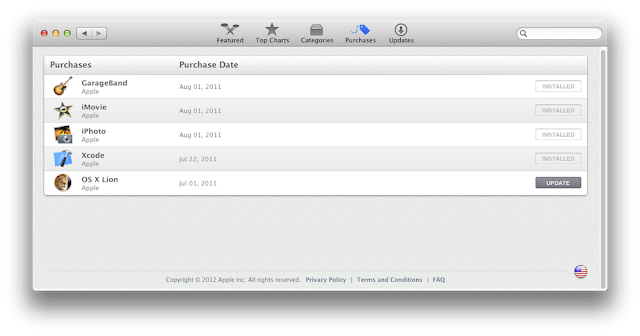 The original installation media for Mac OS X Snow Leopard was a 10.6 DVD. The DVD was only updated once to version 10.6.3. In order to provide more frequent updates to users, Apple is now slipstreaming the latest version of Lion directly into the download. Upon fresh installation, no updating is necessary!
The original installation media for Mac OS X Snow Leopard was a 10.6 DVD. The DVD was only updated once to version 10.6.3. In order to provide more frequent updates to users, Apple is now slipstreaming the latest version of Lion directly into the download. Upon fresh installation, no updating is necessary!
If you purchased Lion from the App Store prior to May 9th, 2012, you most likely have 10.7.3. To re-download Lion and update your App to 10.7.4, simply log into the Mac App Store and click Update. When the download finishes, the app will automatically open. The updated 10.7.4 Install Mac OS X Lion App can be found in the Applications folder.
If you don't see the Update button, follow this simple procedure.
1. Delete your existing copy of Install Mac OS X Lion.app from Applications folder.
2. Hold down the alt/option key on your keyboard, and click the App Store icon.
3. With alt/option key held, click on Purchased
4. With alt/option key held, click on OS X Lion
5. With alt/option key held, click on Install
If neither of the above processes work for you, try creating a new User account. You can delete it later.
1. Open System Preferences
2. Click on Accounts
3. Click Lock Icon
4. Click (+) to add a new User
5. Create a new Admin User
6. Log out, and log into new User
7. Proceed with steps above.
Tested by TonyMacx86





